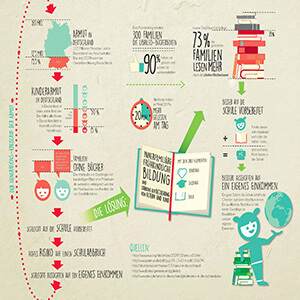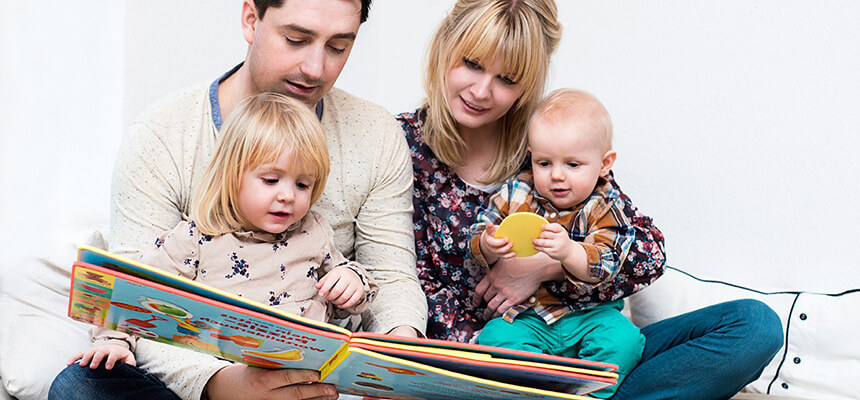 “Before, all I could read with my daughter was advertising supplements...”
“Before, all I could read with my daughter was advertising supplements...”
Librileo book packages bring educational opportunities to families in need
Have you ever wondered why some children fail to move on to the next year at school? Why it is hard for them to learn to read, write and count? Why they speak less than their classmates when starting school? Children's bad performance at school can have a variety of reasons. Scientific studies have shown that the first years in the life of a child can be decisive. Children that have been around books and who have been read to early speak more, stay curious, are eager to learn and enjoy exploring. The family home is where the first education happens. Parents, who start reading to their children regularly as soon as possible after birth and also talk to them about the stories, do something very special with them: this way, children acquire new vocabulary, learn to express thoughts and emotions and their imagination is stimulated. At first it is touch&feel books and colourful images that appeal to children, later stories of adventures and heroes.
Necessity
Age-appropriate book packages consisting of a children's book, a game and an advice booklet for parents. All for families in need.
Activity
The book packages are sent directly to the homes of the financially disadvantaged families.
Countable effort
Number of families in need that received a book package.
Result
Every year, 600 children in need will be better prepared to go to school.
Systemic effect
All the children that received book packages will perform better and be able to keep up with their class mates.
Background
Sadly, there are many families in Germany that do not have any children’s books at home. According to statistics, every fifth child in Germany lives in poverty – almost three million children in total. In most cases, child poverty results in poor education. Children from economically disadvantaged families, on average, perform half as well as children from families that do not receive state benefits. The connection is simple but also very unfair. Families for whom education is a cost factor, are those who the Librileo book boxes target: children need to have access to books, regardless of the income of their parents.
“Before, all I could read with my daughter was advertising supplements…”; “… it feels like we’re looking at the road atlas for the 100th time!”; “Thank you very much for the great book packages!” – This is just some of the feedback that the Librileo team receives from parents. The non-profit education programme supports poor families in taking an active part in fostering their children’s early development: to read, talk and play with them.
The good deed
We support parents in reading to their children. We make it possible for them to stimulate their children from their earliest developmental phase (ages 0 to 6), so they do not have reading, language or learning difficulties once they are in school. We achieve this through innovative book packages that are sent free of charge to poor families four times a year. They are comprised of three elements: children's books, games and advice booklets for the parents. The book packages accompany the children from birth all the way to the first day of school. They foster their linguistic and social skills and strengthen the bond between parent and child in a playful and fun way. Later, these children will have a better start to their school career. Our book packages make a difference: our evaluation of 2015 has shown that 60 % of the parents who received our packages actually did read substantially more with their children.
Challenge
The book packages are free for families at risk of poverty. They get delivered directly to their home and stay within the families. The only thing the parents need to do is sign up for the education programme and claim the book packages. And that is where the largest problem lies: convincing adults who themselves read little or not at all, who have difficulties with reading or in understanding what they are reading (so called functional illiteracy), that books are an absolute necessity for their children. That is why we demonstrate the books. We organise reading events for children and their parents in family centres, mother-child facilities and nurseries. The children participate very actively – and in that way we also reach the parents.

AboutGermany
Berlin
Capital
81 413 100
Number of inhabitants
40 952 USD
Gross domestic product per capita per year
6
Human Development Index
By gross domestic product, Germany is the richest country in Europe. Nevertheless, every fifth child lives in poverty - almost three million children altogether.
About the organization and further information
Association
Librileo gemeinnützig UG
Transparency International




